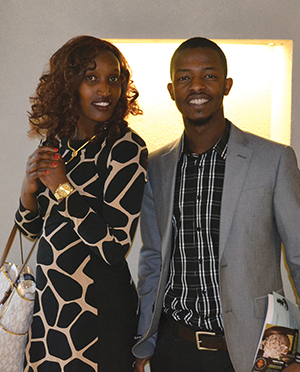War seemed to follow Leonard Ndanyuzwe.
A native of what is now Congo in central Africa, Ndanyuzwe and his family of eight spent years moving about the country trying to escape the violence. They’d walk day and night to settle in a safe place, only to be forced away by renewed conflict, sometimes within months.
Death was common. Some people succumbed to disease. Many were shot by soldiers.
Ndanyuzwe, 24, grew up watching it all.
“I didn’t live in peace,” he said. “I was looking for peace, a place where I could feel comfortable.”
In 2010, the family decided to leave the country. They crossed into Burundi and began the process for refugee resettlement in the United States. With the help of Catholic Social Services (CSS), Leonard arrived in Dayton in November 2013. His family was resettled about a year later and they now live in the Miami Valley.
Ndanyuzwe and Congolese refugee Esperance Gikundiro shared their stories as part of a program on refugee resettlement Jan. 9 at Salem Heights in Dayton. The event also included comments from representatives of Judaism, Christianity and Islam who spoke about their faith’s perspective on refugees, and a presentation by Catholic Social Services of the Miami Valley (CSSMV).
Michael Murphy, program manager of refugee resettlement at CSSMV, outlined the 14 stages of the rigorous United States resettlement screening process for refugees. Among the steps are referral to the United States for resettlement, medical screening, several security screenings and an in-depth interview. Cultural orientation for refugees is provided after they are approved for resettlement in the United States.
The U.S. Refugee Program emphasizes early self-sufficiency. Refugees arrive in this country fully authorized to work and most are supporting themselves within six months, Murphy explained during his presentation.
More than 70 people attended the event, sponsored by the Sisters of the Precious Blood. The idea for the program grew out of a discussion Sisters were having last fall about the refugee crisis and how the Congregation could respond.
“We really wanted to be a catalyst to get some correct information out to people that could perhaps allay some of the fears that people have about Muslims coming into the country or just refugees in general,” said Sister Jeanette Buehler. “There’s an attitude in our country now that’s becoming skeptical of any refugees or immigrants coming into the United States.”
Clarifying misconceptions leads to a more welcoming, inclusive community.
“The more that we can be transparent with community members the more we’re able to have open conversations,” Murphy said. “It breaks down barriers.”
Story and photo by Dave Eck
 From left, Esperance Gikundiro and Leonard Ndanyuzwe, in the Salem Heights chapel on January 9.
From left, Esperance Gikundiro and Leonard Ndanyuzwe, in the Salem Heights chapel on January 9.





